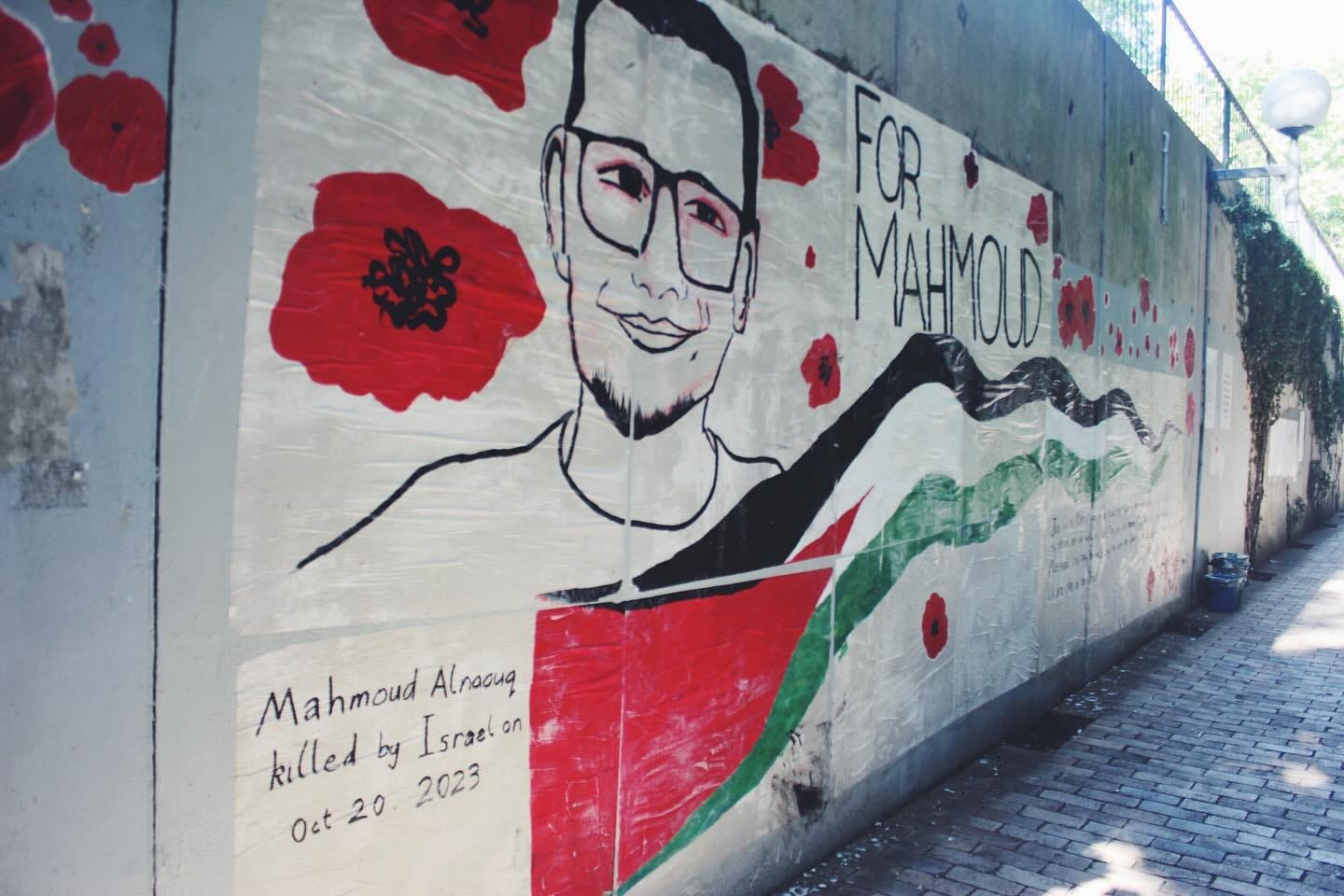Suspension Of Disbelievers: The Student Intifada, Oct 21-30
It's been thirteen months. There's only one way to go from here.
Welcome and welcome back.
With each edition of this publication, it has become harder to hold back the grief, the anger, and the desperation we collectively feel as witnesses to the genocide of the Palestinian people. As the weeks have passed, our work has begun to feel less meaningful even as the urgency of taking action has only increased.
It’s been over a year of live-streamed genocide. The time for even-handed appeals and calling on shared values is over. If we continue to cater to the views of those who preach gradualism, respectability, and compromise, the broadness of our coalitions will not matter because they will not threaten those in power. We cannot move slowly, or with “civility”. We will not be able to convince people who were not moved by the murder of Hind Rajab, Refaat Alareer, Shaban al-Dalou, or the tens and tens of thousands of Palestinians whose stories did not make the news. Well-reasoned arguments for divestment in the arms trade and apartheid have fallen on deaf ears while the instruments of death are sent to the zionist regime by Western governments. We need to speak and act with the urgency this moment requires of us.
Merely wearing a keffiyeh in the library is now punishable, as we’ve seen at Harvard this week. Around the world, comrades are faced with more and more extreme levels of repression as they take actions that make those in power feel unstable. Organizing for Palestine has not yet been rebellious enough to make major institutional change at the majority of our universities, and yet still students are assaulted and arrested. The fight for divestment and an end to complicity is a refusal to ignore the destructive and genocidal arm of Western imperial power, in all its forms. Even those within the imperial core experience violence when protesting for Palestine. What do we call a system so fragile that scarves are banned and student protests are met with tear gas and beatings? Scared.
We should not be asking where we go from here. In our hearts, we know. We need to start asking how we are going to achieve revolution.
We cannot cede ground, and that means we must be prepared for direct confrontation with the state. In our universities, we cannot wait for negotiations to be presented on a platter. We have seen negotiations used as a tactic of delay. In our local, national, and international organizing, we are already running behind. The time to prepare for a fight was long ago, but the next best time is now.
The police forces we face are not the same that earlier generations of activists faced. We are dealing with militaries who use the same technologies as the IOF. In countries where student protest has been all but made impossible, activists still find ways to fight back, risking arrest and – as we saw on a massive scale in Bangladesh this year – death. It’s not yet clear what the consequences of radical activism will mean for our lives when we are surveilled, arrested, and brutalized. But we cannot expect our comrades to fight unarmed. If we do, the state will not hesitate to crush us. We must be uncrushable.
Over the next few weeks, an editorial board of organizers will begin a new series: Fuck (this). It will focus on organizing during a genocide, and contributing what we can to a more radical, aggressive, and committed resistance movement. If you’d like to contribute, get in touch.
What did we miss?
United States, 17th October
Cornell University announced on October 17th that three undergraduate students and one graduate student would receive “persona non grata status” for three years, banning them from campus and ceasing their degree progression. This is believed to be the second multi-year suspension of students for nonviolent, pro-Palestine protest.
These suspensions constitute a concerted attempt to silence pro-Palestine students, particularly anti-Zionist Jewish voices on campus. Cornell is prioritizing the interests of Kraig Kayser, the chair of its Board of Trustees and a major shareholder in arms manufacturer Moog, over the safety and well-being of its student body.
—Jacob Berman, a suspended fourth-year student and Vice President of the Cornell Chapter of Jewish Voices for Peace
Australia, 21st October
Students and staff at the University of Melbourne created a mural to honour the martyr Mahmoud Alaouq, and the more than 12,000 students killed in Gaza during the last year of genocide. Mahmoud was due to start a Masters in International Relations at UMelb, before he was killed by zionist forces on the 20th October, 2023.
Anything else we’ve missed? Let us know!
University of Melbourne referred to the ICC
On Thursday 24th, students at the University of Melbourne issued a statement detailing that they have referred the University Vice-Chancellor, Duncan Maskell, to the International Criminal Court. They are requesting that the ICC’s Prosecutor investigate his — and the University's — complicity in Israel’s war crimes. This is a culmination of a year-long campaign by activists within University of Melbourne 4 Palestine [UM4P] to get the University to sever partnerships with research firms and weapons companies responsible for war crimes in Gaza.
In an interview with Middle East Eye earlier this year, a student protester levied that the University holds “tens of billions of dollars in partnerships” with companies such as Lockheed Martin, Boeing, and BAE systems. The University also holds a partnership with Rosebank Engineering, an Australian company that produces components for the F-35 fighter jets currently being used by Israel in its genocidal onslaught on Gaza. As our Melbourne comrade expressed, this is “direct involvement in the supply chain of genocide”. In their statement this week, students showed that these partnerships indicate that the University could be breaching its international law obligations.
Australian universities function more closely in line with the state than in many other countries. They are mandated to enforce UN Security Council sanctions under Australian sanctions law. Therefore, if the Australian government were to impose any sanctions on Israel — a move which is long, long overdue but still immediately necessary — universities would have to follow suit. As reported in an ABC article from March 2024, an interim ICJ report “puts Australian universities on notice that they too have legal and ethical obligations under both Australian and international law to not be complicit in serious human rights violations, or indeed, genocide.”
The students' referral of their Vice-Chancellor to the ICC is a new tactic and, as they clearly expressed, one which has been resorted to only after all communication channels have been “exhausted”. It will not be a quick process. Students intend for this referral to make the University not only meet its “international and domestic obligations” but also “honour its commitment to students and the broader community to provide an ethical study environment”.
Our universities, across the globe, claim to be the bastions of culture, law, and civility. We cannot let them continue this facade. They are not neutral parties; their finances and reputation bolster Israel’s genocide of the Palestinian people.
Updates from the intifada, Oct 24-30
France
On Friday 25th, student collectives in Île-de-France organized a rally at Place de l'Opéra, Paris, responding to an urgent call from Palestinian communities and institutions after the massacres in North Gaza. Their demands: end the war on Gaza, withdraw Israeli forces, and lift the blockade immediately and without conditions. After the forced cessation of UNRWA activities and more massacres in Beit Lahia by israeli forces, the students called for a second mobilization on Wednesday 30th. This time police forces prevented the demonstration from taking place, blocking people and dispersing crowds rather than allowing peaceful protest.
United Kingdom
From Monday 28th to Thursday 31st, students at the University of Oxford held a four-day vigil on the steps of a University building, reading all the known names of Palestinian martyrs killed over more than a year of live-streamed genocide. 34,344 names were read out — at least 151,656 martyrs’ names are still unknown.

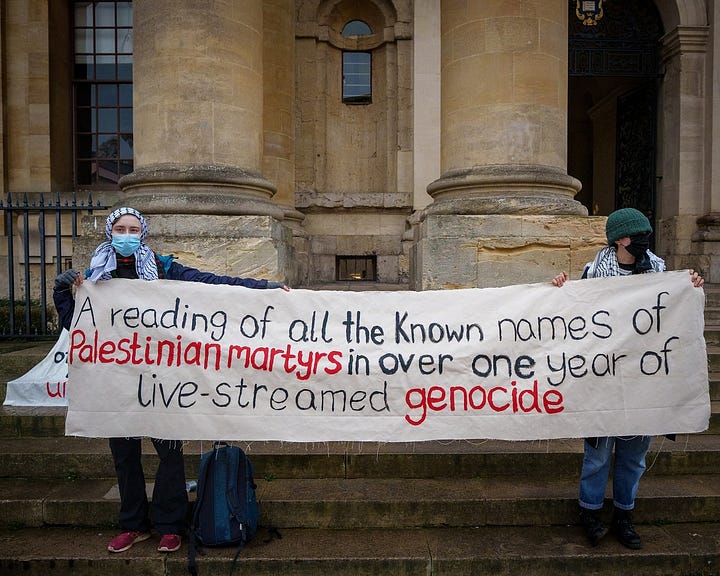
Also ongoing throughout this week, students, faculty, and community members at the University of Cambridge came together to honor the martyrs of Gaza by writing out all of the currently known names of the Palestinian children killed by Israeli genocide. Organizers stated that “these are only a fraction of the thousands of children martyred in israel's year of genocide, one that Cambridge abets morally and materially. We will continue to refuse normalcy while our university supports ethnic cleansing and colonial violence.”


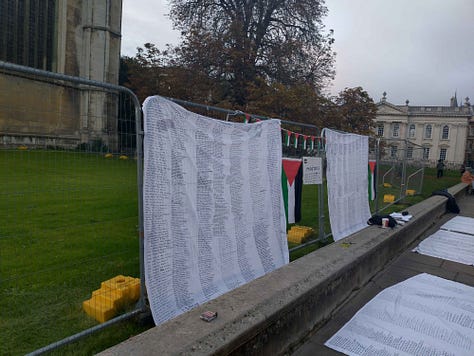
United States
On Thursday 24th, nearly 90 students and faculty were banned from the libraries at Harvard University after a series of keffiyeh study-in events. In total, over the last few months, more than 100 members of the University have been banned from studying in their own libraries. Also at Harvard this week, students protested against the inclusion of the CIA and the Bank of America at the University’s careers fair. Activists held up a banner reading ‘No Jobs for Genocide’ behind their booths, as well as a banner reading ‘CIA RESUME’, detailing their involvement in war crimes and their support for the Israeli military.
On Monday 28th, Cornell University indefinitely suspended fifteen students without due process, banning five from campus, citing their involvement in a career fair disruption on September 18th. A statement released by Cornell Young DSA in response to the suspensions highlighted the injustice of the decision:
Out of 150+ attendees, the suspensions have disproportionately targeted Arab students and organizers @cornellydsa and @jvpcornell. Cornell continues to value the interests of their Board of Trustees over democratic principles, free speech, intellectual debate, and the well-being of students.
Italy
On Friday 25th, students and activists in Rome held a protest outside the U.S. Embassy, demanding an end to American funding and military resourcing of the ongoing genocide against the Palestinian people. Despite police barriers, protesters displayed images of Palestinian children lost to violence, illuminated by candles spelling out "Stop al Genocidio." They denounced the U.S. for its financial, military, and diplomatic backing of Israel, which sustains both American influence in the region and Israel’s apartheid regime. Intifada fino alla vittoria!
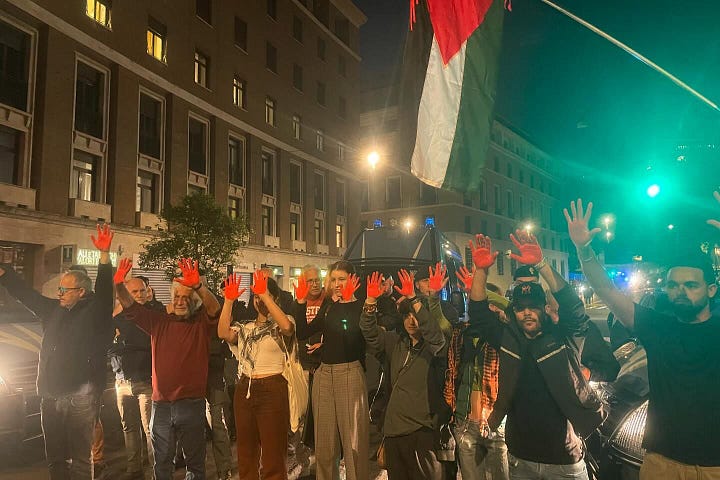
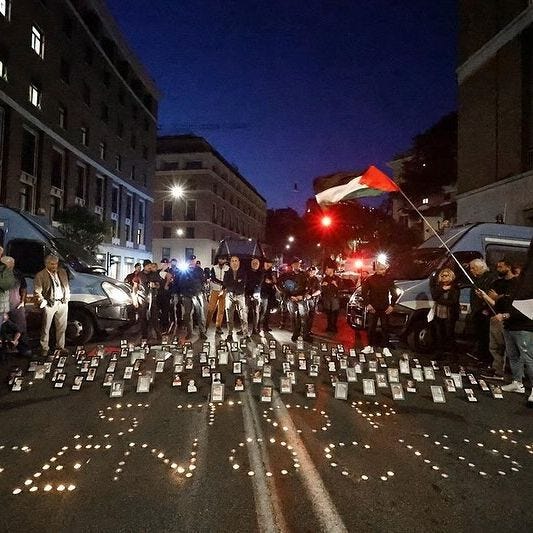
On Monday 28th, students from the encampment for Palestine at the Politecnico di Milano escalated their protest by occupying a building on the University campus, naming it SOCS, "Settore Occupato di Città Studi". Their mission is clear: to stop military research and actively oppose their University’s complicity in the ongoing genocide.
Germany
On Thursday 24th, the administration at Freiburg University called the police on students inside the university, after banning a film screening for allegedly violating the University’s “neutrality”. The film Concerning Violence is based on Frantz Fanon’s book Wretched Of The Earth, and depicts different anti-colonial struggles in Africa against their European colonizers. It is the second time in three months that the administration has decided to call the police on its own students.
On Wednesday 30th, students at the Institut für Europäische Ethnologie of the Humboldt unveiled a banner right across Berlin’s Ministry of (In)Justice. The banner, which remained in place for three hours, referenced Rosa Luxemburg:
Zu sagen was ist bleibt die revolutionärste tat!
To say what is [happening] remains the most revolutionary act!
Poland
Wednesday 30th marked Day 150 of the pro-Palestine encampment at the University of Wrocław. Our comrades in Poland have been consistent and dedicated in their campaign for divestment. It has been a long, determined fight. Solidarity with them, and all other student protesters facing a seemingly endless lack of care from their university administration.
Parting thoughts
Kwame Ture — born Stokely Carmichael — emphasized the importance of organization over mobilization throughout his career. Organizing in groups, he theorized, is the most effective way to build a sustained long-term movement, expand political consciousness, and aid the fight against the system rather than individual issues. In Ture’s words:
Those of us who are revolutionary are not concerned with issues, we are concerned with the system. Mobilization usually leads to reform action, not to revolutionary action.
His concept of intense organizing is at its clearest in the 1968 short film Columbia Revolt, which documents events at Columbia University during the Vietnam War. In 1968, students occupied five buildings on campus in response to the University threatening to build a segregated gym. The students engaged in revolutionary acts of defiance not only against the University and its actions, but against the system as a whole. Within the occupations, we see the fostering of community and the slow radicalization of students. We see the role that student organizers took in shifting public opinion and rallying people around a unified cause. We see the protection of community through the sharing of food and the establishment of communication lines.
Community organization is what developed and maintained the radical transformation of students, even after the police had descended upon them. It led those involved to question not just the symptom of institutional racism, but the system itself.
I was awarded a fellowship for next year. But what does this mean? I cannot attend this school anymore. I believe this situation has radicalized everybody personally.
The short film is available to watch here, recommended by a TSI comrade. We hope it enriches your organizing, for Palestine and beyond.
In solidarity and resistance, The Student Intifada.
Written this week by comrades from the United Kingdom, Germany, Italy, France, and the United States.



